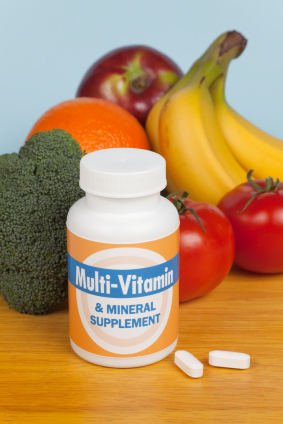Antioxidant Properties of Vitamins
Antioxidant Properties of Vitamins
By: Dr. George Obikoya
A dietary antioxidant is a substance (commonly found in foods) that significantly decreases the harmful effects of "reactive species", such as reactive oxygen and nitrogen molecules, that disrupt normal physiological function on a cellular level in humans.
Examples include the antioxidant nutrients vitamin C, vitamin E, selenium, and the carotenoids. A multitude of other nutrients, including minerals such as copper, manganese, and zinc, flavonoids (such as grape seed extract and phenols found in green tea), and coenzyme Q10, also possess antioxidant properties.
The primary function of vitamin C (ascorbic acid) is the production of collagen, which forms the basis for connective tissue in bones, teeth, and cartilage. It also plays an important role in wound healing, immunity, and the nervous system, and acts as a water-soluble antioxidant.
Because vitamin C is water soluble, its antioxidant functions take place in aqueous body compartments. It also helps protect low-density lipoprotein cholesterol (LDL-C) against free radical damage. As an antioxidant, it helps protect against cancer, cardiovascular disease, and certain effects of aging.
Vitamin E is the name given to a group of eight fat-soluble compounds. Unlike other vitamins, which are involved in metabolic reactions, it appears that the primary role of vitamin E is to act as an antioxidant. Vitamin E is incorporated into the lipid portion of cell membranes and other molecules, protecting these structures from oxidative damage and preventing the propagation of lipid peroxidation. Vitamin E appears to have protective effects against cancer, heart disease, and complications of diabetes.
As an antioxidant, vitamin E plays a protective role in many organs and systems. Vitamin E is necessary for maintaining a healthy immune system, and it protects the thymus and circulating white blood cells from oxidative damage. Also, it may work synergistically with vitamin C in enhancing immune function. Recent research evidence indicates that the combined use of high doses of vitamin C and vitamin E helps prevent Alzheimer's disease. In the eyes, vitamin E is needed for the development of the retina and protects against cataracts and macular degeneration.
Vitamin E deficiency is rare, and occurs mostly in people with chronic liver disease and fat malabsorption syndromes, such as celiac disease and cystic fibrosis. It can lead to nerve damage, lethargy, apathy, inability to concentrate, staggering gait, low thyroid hormone levels, decreased immune response, and anemia. Marginal vitamin E deficiency may be much more common and has been linked to an increased risk of cardiovascular disease and cancer.
The only specific effect of carotenoids in humans is to act as a source of vitamin A in the diet, but they also have important antioxidant actions. The latter are based on the caretenoids' ability to quench singlet oxygen and trap peroxyl radicals, thereby preventing lipid peroxidation.
As a result, carotenoids protect against the development of cancer, cardiovascular disease, and ocular disorders. Carotenoids also affect cell growth regulation and gene expression. Diets low in carotenoids may lead to increased risk of cancer and heart disease. Lycopene is the most potent antioxidant for quenching single oxygen and scavenging free radicals.
Antioxidant nutrients are often thought of as enhancing immune function. Vitamin C, in particular, is generally perceived as useful in the prevention and treatment of the common cold. Some evidence does support a role of vitamin C, vitamin E, and carotenoids in enhancing immunity.
Vitamin C has been found to affect the human immune response, with increased antimicrobial and natural killer cell activities, lymphocyte proliferation, chemotaxis, and delayed dermal sensitivity. Studies have involved pharmacologic doses of vitamin C (200 mg/day to 6 grams/day in addition to dietary intake); therefore, the effect does not appear to apply to nutritional intake of vitamin C from food alone.
There has been much interest in the use of pharmacologic doses of vitamin C to prevent or treat the common cold, and some studies have reported beneficial results. Treatment of the common cold with vitamin C is associated with reduced duration of cold symptoms. Several studies have found a protective effect against breast cancer with beta-carotene.
Because of the widespread effects of oxidation in the body, it is possible that antioxidants protect against a wide array of other ailments, such as certain respiratory disorders. Asthma is characterized by chronic airway inflammation. The generation of oxygen free radicals by activated inflammatory cells produces many of the pathophysiologic changes associated with asthma and may contribute to its pathogenesis. Therefore, antioxidant nutrients may play a role in the prevention and treatment of asthma.
Vitamin C is the major antioxidant present in the surface of the lung, suggesting a protective antioxidant role. A number of studies support the use of vitamin C in allergy and asthma.
Of all the chronic diseases in which excess oxidative stress has been implicated, cardiovascular disease (CVD) has the strongest supporting evidence for the beneficial role of antioxidants. Oxidation of LDL-C may be a key step in the development of atherosclerosis, and atherosclerosis and hypertension are known risk factors in the development of CVD. Thus, antioxidants are potentially useful in preventing or delaying the development of atherosclerosis, and in preventing heart disease.
A good multivitamin is the foundation of health and nutrition. Take a look at our scientific reviews of many of the popular brands for factors such as ingredients, areas of improvement, quality level, and overall value. If you are looking for a high quality liquid multivitamin, we suggest that you take a look at the Multivitamin Product Comparisons
References
Adams AK, Wermuth EO, McBride PE. Antioxidant vitamins and the prevention
of coronary heart disease. Am Fam Physician. 1999;60:895-904.
Padayatty SJ, Levine M. Vitamin C and myocardial infarction: the heart of the matter. Am J Clin Nutr. 2000;71:1027-8. Sinatra ST. "Care," cancer and coenzyme Q10. J Am Coll Cardiol. 1999;33:897-8.
Tekin D, Sin BA, Mungan D, et al. The antioxidative defense in asthma. J Asthma. 2000;37:59-63.
Hatch GE. Asthma, inhaled oxidants, and dietary antioxidants. Am J Clin Nutr. 1995;61:625S-630S.

